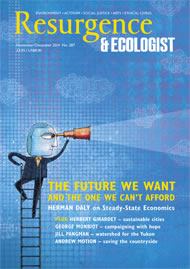There has been so much polemical ink spilt on the question of climate change that it’s refreshing to come across a book that, almost, has no opinion to express at all – other than that we have a problem. This is an academic work, put together by three professors eminent in their respective fields of social theory, ecological economics and environmental politics. It may be academic – the number of bibliographical references exceeds its slender 147 pages – but don’t be put off. It is a highly readable ride around the political, economic and social conundrums posed by the biggest challenge faced by humanity.
The starting point is an unequivocal acceptance of the overwhelming scientific opinion that human activity is causing our climate to change in ways that threaten global stability; the authors assert that “climate change will challenge the human community in many ways for centuries to come.” This is not, therefore, a contribution to the debate between those who accept the scientific evidence about human-induced climate change and those who do not. There is some analysis of that debate and of the reasons why, like some stubborn weed, it refuses to go away. The finger is pointed firmly at “organized denial” of the science, “financed by fossil fuel companies such as Exxon Mobil and run by right-wing think tanks in the US such as the Heritage Foundation” which “aims at winning, not understanding or reasoning”.
The bad news is that, according to this analysis, the deniers are the only people who are winning. Politicians seem incapable of delivering the kind of radical long-term policies that are needed within their national boundaries, let alone globally; in the US, Canada and Australia in particular there is potent and active hostility to the science (sometimes fuelled by religion); despite a huge investment in renewable energy, China has become the world’s largest emitter of CO2; India seems disengaged; the UN process has stalled; economists squabble about how to account for potential disaster; climate change scientists disagree about details and are hung out to dry by unfamiliar encounters with the media; and such policies as do exist, for example carbon trading, have been easily subverted by vested interests. Not surprisingly, as a result, the global public is confused and inclined to believe that – if there is a problem at all – it’s somebody else’s job to sort it out.
For all their erudition and deep knowledge, the authors are short of solutions. In classic academic mode, suggestions are made and then countered. For example, they maintain that face-to-face engagement with the public on the issue would be the best way of persuading people that there is something to be done; then they recognise the practical impossibility of doing that. On the question of climate justice, they delineate the issue and then refer to the need for “engaging people ... in democratic deliberation about just adaptation policy”. That won’t work either.
Another thing that won’t work, but is explored, is the “biomedical modification of humans to make them better at mitigating climate change” in order to deliver the “pharmalogical enhancement of altruism and empathy”. The authors don’t endorse that approach, thank goodness. GM crops are disturbing enough; but GM humans? The authors also raise – and then question – the idea of seeding the oceans with iron to increase their ability to absorb CO2; and then there’s the notion of injecting sulphate aerosols into the atmosphere in order to block solar radiation. These are counsels of despair.
So this book raises far more questions than it answers. But if you want to know what the questions are, it is a great place to start.







